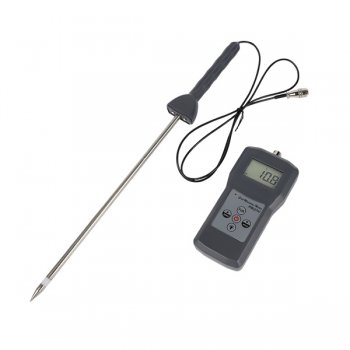Why Every Home Owner Demands a Moisture Meter: Key Advantages and Features
Why Every Home Owner Demands a Moisture Meter: Key Advantages and Features
Blog Article
The Ultimate Overview to Dampness Meters: A Comprehensive Introduction and Just How They Can Conserve You Money
In the world of building upkeep, building, and various sectors, the significance of accurately gauging moisture levels can not be overstated. Wetness meters offer as crucial devices in identifying and checking moisture web content in products, assisting in stopping expensive damages and guaranteeing the quality of items. Understanding the nuances of different sorts of wetness meters, their applications, and the potential cost-saving advantages they offer can be a game-changer for professionals and services alike. Finding just how these devices can not just enhance procedures yet likewise contribute to financial savings is a journey worth starting.
Kinds of Dampness Meters
Various kinds of dampness meters are available for different applications in various markets. One typical type is the pin-type dampness meter, which gauges the electric resistance in between two pins inserted into a material. This type appropriates for timber, drywall, and other building materials. Pinless wetness meters, on the other hand, use electro-magnetic sensing unit plates to scan a bigger location without triggering damages to the product's surface area. Moisture Meter. These meters are ideal for promptly evaluating wetness levels in large areas such as walls and floors.

Infrared wetness meters measure the thermal homes of a product to determine its wetness web content non-invasively, making them beneficial for applications where pin or pinless meters might not be ideal. Comprehending the various kinds of moisture meters offered can aid industries pick the most suitable device for their certain wetness dimension needs.

Benefits of Utilizing Moisture Meters
Dampness meters offer indispensable benefits in precisely checking and assessing wetness degrees in varied products and atmospheres. One of the primary benefits of utilizing wetness meters is the avoidance of prospective damage triggered by excess moisture.
Moreover, using wetness meters can lead to increased energy performance. In agricultural settings, dampness meters play an important duty in optimizing plant returns by enabling farmers to keep an eye on soil wetness degrees and make educated irrigation decisions.
Just How to Choose the Right Wetness Meter
When selecting a wetness meter, it's important to ensure that the meter is ideal for the certain material you will be screening. Different materials have differing electric buildings that can impact dampness readings, so selecting a meter developed for your material is critical for precise results. By meticulously examining these elements, you can pick a wetness meter that meets your requirements and offers exact wetness dimensions for your jobs.
Proper Methods for Moisture Meter Use

Expense Cost Savings With Moisture Meter Applications
Exactly how can the tactical usage of moisture meters lead to substantial price financial savings throughout various industries? Moisture meters play an important role in cost financial savings by stopping prospective damage and ensuring top quality control in various markets. In the agriculture sector, dampness meters help in identifying the optimal time for collecting plants, stopping over-drying or excess moisture that can influence the final product's top quality. This exact tracking helps farmers avoid unneeded losses and optimize their yield.
In a similar way, in building, moisture meters aid protect against costly damages by identifying wetness degrees in building products, such as wood or concrete, which can bring about structural concerns if not resolved immediately. By identifying trouble locations early, professionals can take rehabilitative steps to prevent comprehensive fixings or replacements, eventually conserving time and money.
Moreover, in the food handling industry, wetness meters are essential for keeping an eye on item top quality and ensuring conformity with safety and security regulations. By accurately determining wetness material in food, manufacturers can prevent putridity, preserve freshness, and minimize waste, leading to considerable price financial savings. On the whole, the strategic application of moisture meters is an important investment that can cause considerable expense decreases and improved performance across various markets.
Verdict
To conclude, wetness meters are beneficial devices for determining and discovering wetness degrees in numerous products. By using the best moisture meter and following correct strategies, individuals can efficiently avoid costly problems brought on by excess wetness. Buying a quality dampness meter can cause significant cost financial savings over time by identifying possible problems at an early stage and enabling punctual remediation. Ultimately, dampness meters are necessary instruments for maintaining the stability and durability of materials and frameworks.
Dampness meters offer as important tools in spotting and monitoring moisture content in products, assisting in preventing pricey problems and guaranteeing the quality of products. Infrared dampness meters determine the thermal residential properties of a material to identify its dampness Visit This Link material non-invasively, making them useful for applications where pin or pinless meters might not be appropriate.Moisture meters offer very useful advantages in properly monitoring and analyzing moisture levels in diverse materials and atmospheres. In farming setups, moisture meters play a vital duty in optimizing crop yields by allowing farmers to keep an eye on dirt dampness levels and make informed irrigation decisions.In final thought, wetness meters are useful devices for measuring and discovering wetness levels in different materials.
Report this page